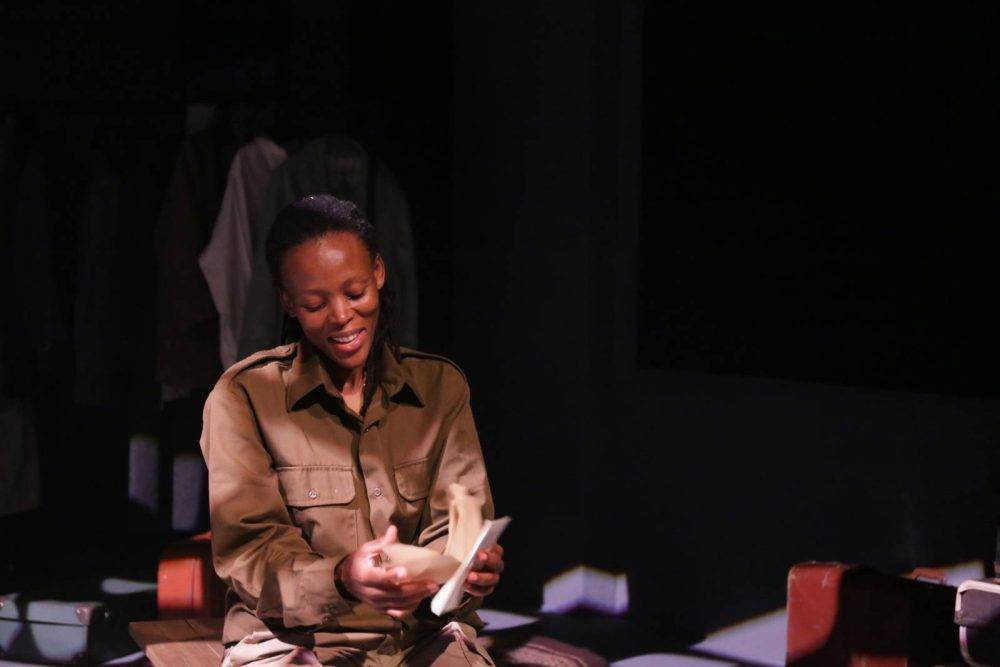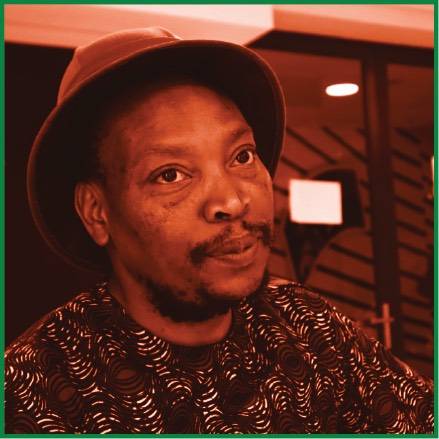Zizana Peteni plays Robert Sobukwe in the play Lala Ngenxeba/Of Love and Revolution, written by Monageng ‘Vice’ Motshabi which is on at Joburg’s Market Theatre. Photos: Thandile Zwelibanzi
Pan Africanist Congress founder Robert Mangaliso Sobukwe (1924 – 1978) would have been 100 this week. The Market Theatre play Lala Ngenxeba/Of Love and Revolution offers a profound exploration of his legacy, shifting the focus from his political philosophy to the deeply personal dimensions of his life.
Inspired by a letter Sobukwe wrote to his wife Veronica Zondeni Sobukwe, the play captures the emotional depth and human vulnerability behind his revolutionary ideals.
For Monageng “Vice” Motshabi, who wrote the play, the letter transformed Sobukwe from a near-mythical figure of resistance into a man who loved deeply and endured unimaginable suffering.
The title, Lala Ngenxeba — isiXhosa for “lie on the wound” — indicates the play’s dual exploration of pain and resilience.
And as Motshabi tells the Mail & Guardian, this portrayal rejects mythologising struggle heroes, instead presenting Sobukwe as an ordinary man who faced extraordinary challenges.
Lesego Chepape: What inspired you to focus on Robert Sobukwe’s personal life, particularly his relationship with Veronica Sobukwe?
Monageng Motshabi: The inspiration came primarily from how moved I was by Thandolwethu Sipuye’s sharing of one of Mangaliso Sobukwe’s letters to his wife during a panel discussion in honour of Sobukwe, organised by the City of Joburg earlier this year.
I noticed how, while the rest of the conversation stimulated my mind and appealed to parts of me that grapple with Sobukwe as a god-like figure because of his intellect, Sipuye’s reading of the letter presented a man who was in love with his wife and grateful for her courage and loyalty in the midst of the apartheid state’s onslaught on them.
This went straight to my heart and I thought it would be worthwhile to create an experience that goes primarily to the heart and then engages the intellect.
 Pulane Rampoana plays Robert Sobukwe’s wife Veronica Sobukwe in the play Lala Ngenxeba/Of Love and Revolution
Pulane Rampoana plays Robert Sobukwe’s wife Veronica Sobukwe in the play Lala Ngenxeba/Of Love and Revolution
It seemed like the door I needed to walk through to understand what the impact of the price Tat’u Sobukwe paid was on him and Mam’ Zondeni. I wanted to lift the veil of stoicism and god-like resistance to pain and stare at the wound.
Can you elaborate on the significance of the title Lala Ngenxeba/Of Love and Revolution?
It is drawn from an isiXhosa saying that encourages those confronted with pain to lie on the wound, both as a way of facing and embracing the pain and also as a way of learning not to cry foul too much about the occurrence of tragic events — since they are guests in every house and an unavoidable part of being human.
It is essentially about accepting one’s lot and recognising that all who live experience pain in one way or another.
The play attempts to zoom in on this wound as it relates to Tat’u Mangaliso and explores the effect the wound he kept unseen may have had on him and how in a way it is also what ate his body from within. This apartheid-induced wound.
The love and revolution aspect speaks to the question of love as it relates to Tat’u Mangaliso’s love for black people and the price he ultimately paid for it.
It is also a useful frame for exploring the relationship with Mama Zondeni since a deep love was the anchor of this relationship.
There is no attempt at a rosy, “mcwah-mcwah” Valentine’s Day kind of “I love you” performance of connection between people, but an exploration of love as a willingness to serve, suffer and sacrifice on behalf of the one(s) one loves.
What role do Sobukwe’s prison letters play in shaping the narrative structure of the play?
The letters are one among many sources that the play draws from, so they aren’t central to how the play’s structure works.
There are excerpts of letters that appear during a certain period of Sobukwe’s life and then there are letters whose content has been dramatised or from which sentences have been pulled to inform dialogue.
It is also important to note here that the play as written may not be the play as staged, even though what is expressed here should generally be easy to locate in the performance.
Why do you think it is essential to portray figures like Sobukwe as ordinary people with everyday struggles and joys?
Well, one because they are/were human. So it’s a lie to claim otherwise.
But, two, because Sobukwe never pretended he was anything but human. He never took his intellectual clarity and sharpness for superiority and was never deluded by people’s willingness to follow him and honour his vision.
He insisted on exuding love, warmth and humanness in the face of apartheid hell in ways that are not easy to understand and it makes sense why many consider him god-like. Maybe he was god-like. But even then, he was a god-like human being.
The danger of presenting struggle heroes without a human side is that one ends up with an image of a very special and superhuman being that has no real value in helping us engage the world as human beings now.
It keeps up looking up at these deities we create in ways that are not only false but also in ways that allow us to be duped into thinking those who spout rhetoric, supposedly inspired by the deities, have our best interests at heart.
Studying limitations has more value than singing praises. Especially at a time when so-called struggle heroes, who haven’t liberated anyone, not even themselves, walk around with inflated egos because there are far too many sycophants hoping to get a seat at the table by being champion praise singers.
What insights about Sobukwe’s legacy do you hope audiences will take away from this play?
That without a willingness to lose privilege and the soft “let’s eat, chief” life, we all become collaborators in a system designed to chain us.
 Monageng ‘Vice’ Motshabi wrote the play Lala Ngenxeba/Of Love and Revolution, which is on at Joburg’s Market Theatre.
Monageng ‘Vice’ Motshabi wrote the play Lala Ngenxeba/Of Love and Revolution, which is on at Joburg’s Market Theatre.
That there is still a call to serve, suffer and sacrifice and that with a goal, commitment and a love as clear as Sobukwe’s, who knows what we might achieve.
But, of course, the play will do what it does and mean what it means to different people.
If Sobukwe were watching this play, which scene do you think would make him laugh — or cringe?
I think the scene that touches on the psychological impact of solitary confinement on Robben Island might be one to arouse his interest.
This is when Sobukwe was convinced there were secret torture devices used against him in both Robben Island and Kimberley.
I can’t say I know how he would react to it but I suspect it’s an area that might hold unpleasant memories and might speak to the cost of freedom on his person and his family more than others.
In exploring Sobukwe’s letters, did you ever feel like you were eavesdropping on a private conversation?
Reading the letters definitely felt like eavesdropping. It’s intriguing how Sobukwe managed to retain the honesty and emotional clarity even as he was aware the state was reading the letters and screening them.
It is the personal, and often intimate, quality of the letters that pushed me to keep searching for a way to dramatise some of the events and to try and find a way to echo the intimacy, even of the solitude.
There is never a guarantee what is on the page will be matched in the staging. But the goal, as inspired by the letters, was to create a feeling of, at times, eavesdropping while at times being deliberately pulled into the intimate world by characters who address the audience directly, sometimes in between private exchanges.
If you could add a modern soundtrack to Sobukwe’s life, what would be the top three songs and would they make it into the play?
Victor Ntoni’s Thetha would be one Mangaliso would slow-dance to with his wife. I suspect he would weep when he listens to Thandiswa Mazwai’s Nizalwa Ngobani? and I think he would totally jam to Iphupho Lika Biko’s Abaphezulu.
What’s one line in the play you think audiences will want to quote endlessly?
The one line that stayed with me, that I hope the audience ponders beyond the performance, is a line by Sobukwe himself in a speech in Cape Town (according to Philip Kgasana): “Abelungu abasithandayo, basingena ngenxeba njengempethu” (Our white liberal friends enter through the wound like a worm).
It stays with me especially because of how the liberals then proceeded to enter through his wound when he starts paying the price for his actions against the state. I think it’s a line worth pondering because of where black people find themselves now.
Lala Ngenxeba/Of Love and Revolution runs until 8 December at The Market Theatre in Johannesburg.